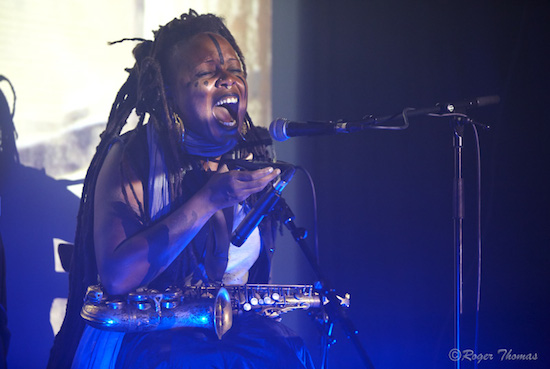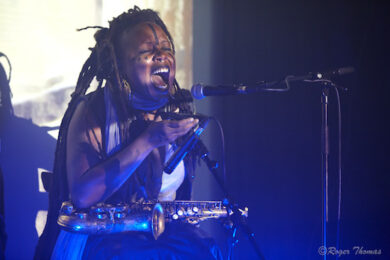Photo by Roger Thomas
Matana Roberts’ third installment in her projected 12-album Coin Coin project, River Run Thee is looking odds-on to sit pretty as best album of 2015 come December, so a chance to see it performed in its magisterial entirety live was not to be missed. To add to the occasion, I learn on the day that eccentric singer-songwriter Eric Chenaux will be opening for Roberts, so double doses of excitement all round.
Chenaux’s tenth studio album, Skullsplitter, has been another highlight of the year, and he plunders it extensively for his brief, but fascinating, set. Seated with his electric guitar, and his beard and glasses, he looks more like a twinkly-eyed philosophy professor than one of the more radical proponents of solo guitar-and-voice songwriting, but any such impressions are wiped clear as he lurches into ‘Have I Lost My Eyes’, the opening track on Skullsplitter, and perhaps the most indicative of his unique style: warbling, effect-drunken electric guitar riffs chime out of his guitar like unsteady peals of a warped bell, a sort of psychedelic, surf rock answer to the angry solo grunge of Neil Young on his tour supporting Le Noise. But where his fellow Canadian is rough and angry, Eric Chenaux has a voice like a soft caress, warm yet melancholic as he reels out his bizarre, yet haunting, lyrics. The way he plucks notes is refreshingly unsteady (although this is surely deliberate), his solos and riffs dislocated by abrupt silences and shifts in tempo. On record, these are already startling, but live he takes them to new heights, settling himself somewhere in a magical netherworld between Jandek and the aforementioned Neil Young.
His inter-song chit-chat is as warm and funny as his music is unusual and unexpected, with the title song from Skullsplitter, arguably one of the most beautiful released this year, not the aching love song I thought it to be, but turns out in fact to be the description of a brand of ale! Somehow, this doesn’t diminish this superb ballad’s haunting impact, especially when he segues into a rousing, slow-burning solo. I reviewed Skullsplitter earlier in the year and, whilst it was hugely positive review, I did sometimes lament the awkward fit between music and lyrics. Suddenly, at Oslo, it all fell into place and I realised how clearly I’d missed the point. Eric Chenaux’s music is potent because it contorts melody and structure in a genre that has long been stifled by a lack of new directions.
"This is an experiment – I don’t know how it’s gonna end, I just know how it’s gonna start" is how Matana Roberts opens her set, but it feels celebratory rather than daunting, and of course she pulls off the entirety of River Run Thee without a hitch and with the power and emotion of that incredible album heightened tenfold. She sits cross-legged for most of the set, her saxophone propped on her knees when she’s not blazing out freeform solos and instead either singing or building up the loops that form the backbone of the album via a neat set of devices, whilst ghostly photographs taken from the artwork of all three current Coin Coin albums are projected behind her to form a phantasmagorical, emotionally-laden tapestry.
Apart from the aspects of her art that one most expects (the crystalline voice, the vocal loops, the Coltrane-like sax lines…), Roberts stands out in the way she actually listens to the what she’s sculpting as she performs, maintaining a certain tension as the various samples, drones and effects swirl around her like the cosmos. Her hands hover over her mixer and sampler, deftly deploying each texture, whilst a worn book provides lyrical cues for the words, turning the concert into something approaching a ritual or sermon, the visuals providing a snapshot of a reality both historical and inferred. Taking a step back, the way Roberts orchestrates her invisible roster of musicians bridges the gap between performance art and jazz-folk storytelling, the weight of the truth she sings growing more haunting as the faces peer out of the screen behind her, and she enumerates the sheer numbers of souls lost to slavery.
Because that’s what lies at the heart of the Coin Coin project: those millions of people forcibly displaced and reduced to the status of possession. Matana Roberts seems visibly moved by lines such as "Why do we try so hard? / Because we should", and that emotion seeps into the listener as well. Her saxophone solos are cries to heaven, forcing home the sense of both powerlessness and defiance her ancestors must have felt as if she is channeling every ounce of despair, rage and hope they must have felt and hurling back at the world. At one point, she repeats the words "I pledge allegiance to the flag, for liberty and justice for…some" and this music’s weighty relevance in 2015 comes hurtling into raw focus, with the ghosts of Trayvon Martin, Michael Brown and so many others joining the legions pouring out of the screen behind Matana Roberts, reminding all present that the legacy of what she is exploring tonight has terrible repercussions today.
<div class="fb-comments" data-href="http://thequietus.com/articles/19028-live-report-matana-roberts-reviewed” data-width="550">



